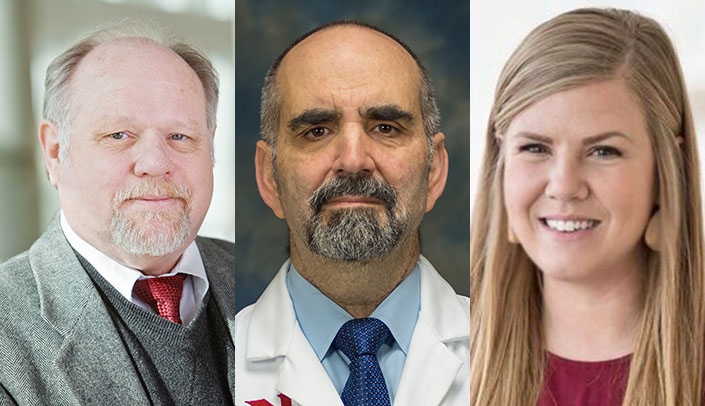Researchers at UNMC have collaborated with Moderna to provide a proof-of-concept preclinical study that could lead to the first therapeutic Parkinson’s immunotherapy. The study used an mRNA-encoded cytokine to reprogram the immune system to fight Parkinson’s disease and possibly other neurodegenerative disorders.
Moderna’s mRNA platform was employed by Katherine Olson, PhD, R. Lee Mosley, PhD, Howard Gendelman, MD, and colleagues for use as therapy in Parkinson’s disease. The paper appears in Biomaterials, the leading biomedical journal of its kind.
“The goal is to generate a potent immune response that will change an inflammatory brain environment into something that will reverse nerve cell damage in Parkinson’s disease,” said Dr. Olson, instructor in the UNMC Department of Pharmacology and Experimental Neurology and first author on the paper.
During the study, co-led by Moderna researchers, investigators tested a lipid nanoparticle containing messenger RNA (Gm-csf mRNA) encoding for a protein called granulocyte-macrophage colony stimulating factor (GM-CSF) that shifts the immune system from a neurotoxic into a reparative mode by inducing regulatory T-cells (Tregs). This led to protection of vulnerable neurons observed in disease affected brain.
“We’ve reprogrammed the immune system to protect specific brain cells against damage,” Dr. Mosley said.
In Parkinson’s disease, neurons in a specific region of the brain responsible for movement and some cognitive and behavioral functions are slowly damaged.
“There is debate as to how the nerve cells are killed, with theories including change in oxidative stress, the accumulation of abnormal proteins, neuroinflammation, exposures to toxic chemicals, and a genetic component,” Dr. Gendelman said. “But, no matter the cause, the environment changes in the region of the brain that’s afflicted. The supporting cells, called glia, can become toxic, changing the environment to an inflammatory milieu that makes these nerve cells dysfunctional and die.”
Researchers at UNMC and elsewhere have demonstrated that decreasing the brain’s inflammatory microenvironment through the induction of Tregs can slow and/or attenuate neuronal loss, with the hope of slowing or halting disease progression.
In the published study, the alternative drug delivery system achieved through the collaboration with Moderna led to increased Treg numbers, enhanced immune regulatory function, and potent neuroprotective activities in preclinical models of Parkinson’s disease following mRNA treatments. Cytokine profiling and transcriptomic analysis by single-cell RNA sequencing was used to confirm shifts in innate and adaptive immune populations following treatment.
These findings, the researchers say, warrant additional steps toward clinical translation of immune modulating mRNA treatment and have broad therapeutic potential for a range of neurodegenerative diseases.

Great work! Congratulations to the team led by Dr. Gendelman!
Wow this is exciting progress. I hope the work continues and Parkinson's sufferers can be helped.
Congratulations to you ALL!
Congratulations, Well done !!
Very nice work indeed.
Congratulations to all and best is yet to come from this collaboration.
Heartly congratulations, Dr. Gendelman and the team.
Awesome work. Congrats to all!
The prospect of this is immensely exciting. I am 45 years old and I have early stage Parkinson's. I pray for this therapy to become a reality for the sake of my whole family.
I am 67 years old and on the day after my last birthday I was diagnosed with early stages of Parkinson’s disease. This article albeit extremely technical gives us sufferers hope for a possible treatment. Thanks.
This is incredible work being done. Will/when will future studies or clinical trials become available? And, how can someone volunteer for either?
We are all thank you for this work..
Very encouraging news! Congrats! What is the latest update on the project
Has there been any advances since May 2021?
Hi , John Bishop here from South Australia, did the Moderna Parkinson’s Trial go ahead ? If so any results as yet ?
Thanks and regards John